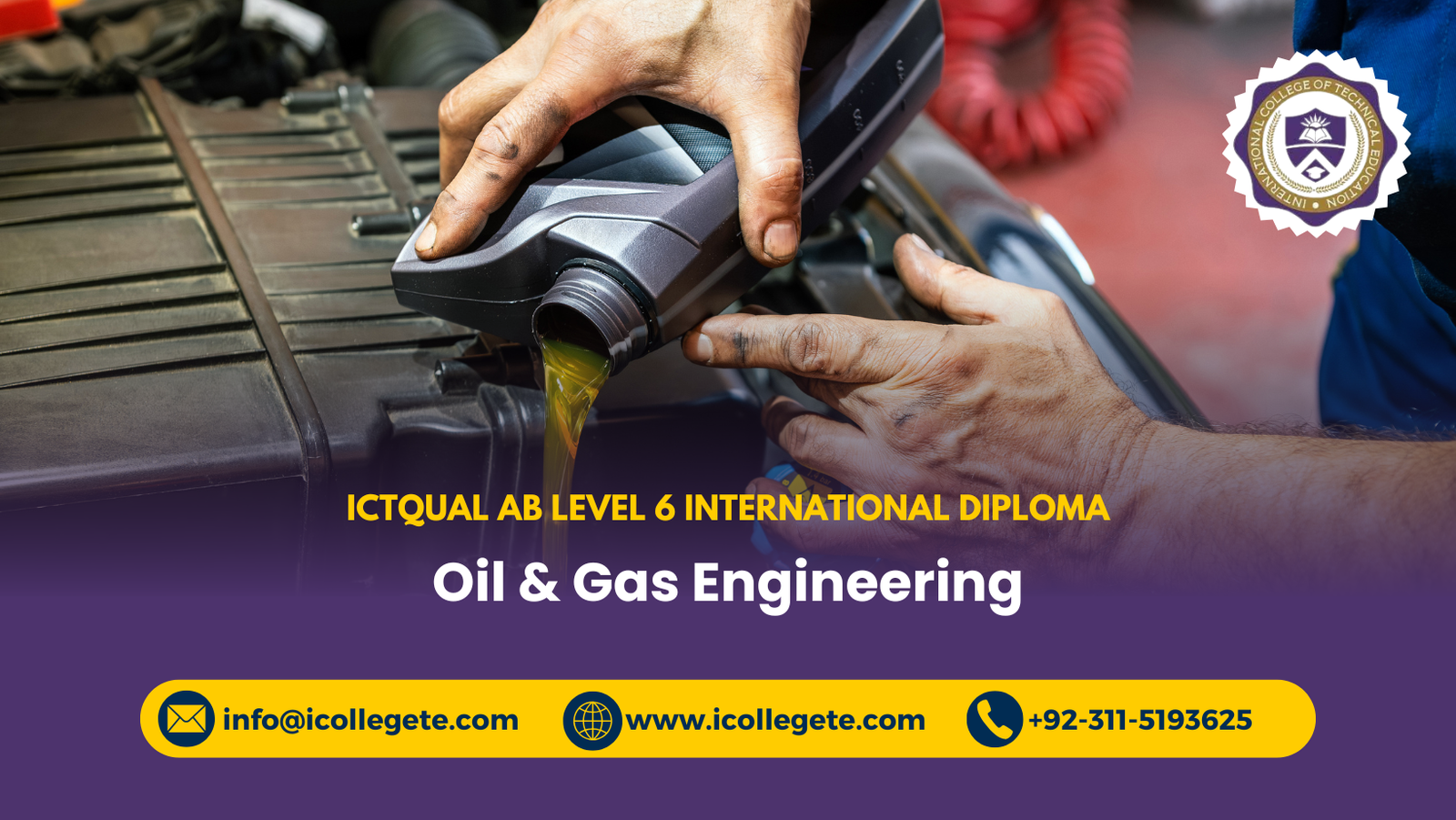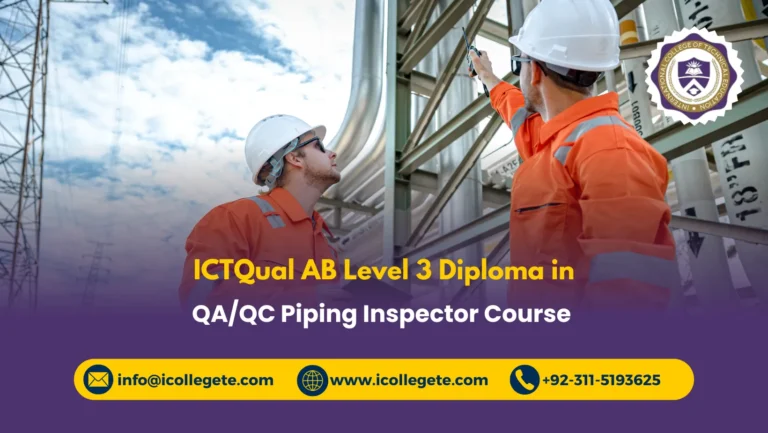The ICTQual AB Level 6 International Diploma in Oil & Gas Engineering is a prestigious qualification designed to prepare professionals for leadership roles in one of the world’s most critical industries. This advanced program equips learners with in‑depth knowledge of oil & gas exploration, production engineering, pipeline operations, and risk management, ensuring graduates are well‑prepared to tackle complex challenges in the global energy sector.
This diploma emphasizes practical skills and international safety standards, making it highly relevant for professionals working in upstream, midstream, and downstream operations. Learners gain expertise in reservoir engineering, drilling technology, and health, safety & environment (HSE) practices, ensuring they can contribute to sustainable and efficient energy production.
Graduates of this program are positioned for high‑demand careers as Petroleum Engineers, Project Managers, Safety Specialists, and Consultants in the global oil & gas industry.
Year 1 – Foundation in Oil & Gas Engineering
- Principles of Oil & Gas Engineering
- Introduction to Petroleum Exploration and Production
- Drilling and Well Engineering Fundamentals
- Construction Materials and Methods in Oil & Gas Projects
- Process Engineering Basics
- Project Planning and Scheduling in Oil & Gas Engineering
- Health, Safety, and Environmental Awareness in Oil & Gas
- Communication and Stakeholder Management in Energy Projects
- Digital Tools and Simulation Software in Oil & Gas
- Financial Management in Oil & Gas Projects
- Quality Assurance and Control in Engineering Operations
- Legal and Regulatory Frameworks in Oil & Gas
Year 2 – Intermediate Oil & Gas Engineering Practices
- Advanced Drilling Techniques and Well Operations
- Resource Management and Allocation in Oil & Gas Projects
- Process Design and Optimisation
- Pipeline and Infrastructure Engineering
- Procurement and Supply Chain Management in Energy Projects
- Project Risk Analysis and Mitigation
- Leadership and Team Management in Engineering Projects
- Offshore and Onshore Operations Management
- Sustainability and Environmental Management in Oil & Gas
- Project Monitoring and Reporting in Engineering Projects
- Problem-Solving and Decision-Making in Oil & Gas Projects
- Communication and Negotiation Skills in Energy Projects
Year 3 – Advanced Oil & Gas Engineering and Strategic Leadership
- Strategic Oil & Gas Project Management
- Advanced Production and Reservoir Engineering
- Energy Systems and Infrastructure Planning
- Innovation and Emerging Technologies in Oil & Gas
- Advanced Risk and Crisis Management in Engineering Projects
- Contract Management and Legal Compliance in Energy Projects
- Leadership in Oil & Gas Projects
- Advanced Project Control and Performance Measurement
- Project Governance and Compliance in Oil & Gas Operations
- Research Methods and Project Analysis in Energy Engineering
- Capstone Project in Oil & Gas Engineering
- Professional Development and Career Planning
1. Understanding Core Oil & Gas Engineering Principles
- Gain an in-depth understanding of upstream, midstream, and downstream operations in the oil and gas industry.
- Learn about the geology of petroleum systems and hydrocarbon exploration techniques.
- Understand drilling operations, well completion, and production processes.
- Study reservoir engineering fundamentals and fluid flow through porous media.
- Develop knowledge of pipeline systems and offshore platform design.
- Apply engineering concepts to enhance oil recovery and minimize operational risks.
- Analyze the lifecycle of oil and gas projects from exploration to decommissioning.
2. Mastery of Drilling and Production Operations
- Understand the design, planning, and execution of drilling programs.
- Learn the function and maintenance of drilling equipment and tools.
- Study well control techniques and emergency response procedures.
- Gain insights into formation evaluation and well logging practices.
- Explore production optimization techniques for oil and gas wells.
- Understand safety protocols and environmental considerations in drilling.
- Learn the integration of automation and digital technology in drilling operations.
3. Safety, Risk, and Environmental Management
- Develop awareness of international safety standards and regulations.
- Learn risk assessment and hazard identification methods.
- Study environmental management systems specific to oil and gas operations.
- Understand the impact of spills, emissions, and waste on the ecosystem.
- Apply mitigation strategies to reduce environmental footprints.
- Gain knowledge of health and safety management systems (HSE).
- Explore sustainable energy transition practices in petroleum engineering.
4. Project Planning and Management Skills
- Learn project scheduling, budgeting, and cost control in oil and gas projects.
- Understand quality management systems and performance evaluation.
- Study procurement, logistics, and contract management in the energy sector.
- Apply leadership and communication skills for team coordination.
- Analyze project risks and develop mitigation strategies.
- Explore digital project management tools and technologies.
- Develop decision-making skills using data-driven project insights.
5. Technical and Analytical Skills Development
- Master the use of industry software for simulation and modeling.
- Learn how to interpret seismic data and reservoir performance.
- Apply computational tools for production forecasting and optimization.
- Understand fluid mechanics, thermodynamics, and material science principles.
- Analyze field data to improve operational efficiency.
- Use problem-solving approaches for troubleshooting engineering issues.
- Integrate innovation and technology to improve energy output and safety.
6. Professional and Ethical Competencies
- Understand global energy ethics and corporate social responsibility.
- Demonstrate professional behavior in diverse engineering environments.
- Apply international codes and standards in oil and gas projects.
- Enhance teamwork and leadership capabilities in multicultural teams.
- Develop effective communication and technical reporting skills.
- Commit to lifelong learning and continuous professional development.
- Promote ethical decision-making and environmental responsibility.
7. Global Industry Knowledge and Future Trends
- Gain awareness of current trends in the global oil and gas market.
- Understand the transition to renewable energy and hybrid systems.
- Learn about innovative technologies like AI, IoT, and automation in energy.
- Analyze the geopolitical and economic factors affecting oil and gas trade.
- Explore carbon capture, utilization, and storage (CCUS) methods.
- Study the integration of sustainability in engineering practices.
- Prepare for leadership roles in emerging energy and technology fields.
1. Comprehensive Understanding of Oil & Gas Operations
- Gain in-depth knowledge of upstream, midstream, and downstream operations.
- Learn about drilling technologies, reservoir management, and production systems.
- Understand the principles of pipeline design, fluid mechanics, and hydrocarbon processing.
- Develop the ability to analyze energy resources and extraction techniques.
- Enhance technical expertise in exploration and field development.
- Stay updated with the latest global oil and gas industry trends.
2. Enhanced Career Opportunities
- Qualify for various positions in petroleum, gas, and energy sectors worldwide.
- Open doors to roles such as petroleum engineer, drilling technician, and production manager.
- Improve your eligibility for international employment opportunities.
- Strengthen your career profile with a globally recognized Level 6 qualification.
- Build a professional network with industry experts and global employers.
- Gain recognition as a certified oil and gas professional.
3. Development of Technical and Managerial Skills
- Acquire essential engineering and project management skills.
- Learn to apply risk assessment and safety protocols effectively.
- Improve your ability to plan, execute, and manage engineering projects.
- Gain experience in technical reporting and operational decision-making.
- Strengthen leadership and team coordination skills.
- Develop strategic thinking for sustainable energy management.
4. Global Recognition and Career Advancement
- The qualification is internationally accredited by ICTQual AB, ensuring credibility.
- Recognized by engineering institutions and energy organizations globally.
- Enables graduates to pursue advanced degrees or professional certifications.
- Provides a pathway for international career mobility.
- Boosts professional reputation and enhances job security in competitive industries.
- Validates your skills to meet international oil and gas standards.
5. Practical and Industry-Relevant Learning
- The course combines theoretical knowledge with real-world applications.
- Includes case studies and industry-based simulations.
- Provides exposure to modern tools, equipment, and safety systems.
- Focuses on hands-on learning for field and site operations.
- Encourages participation in industrial training and research projects.
- Prepares students to handle complex operational and environmental challenges.
- Individuals aspiring to build a professional career in the oil, gas, and energy sector at a technical or managerial level.
- Engineering graduates or diploma holders seeking specialized knowledge in petroleum, drilling, refining, and production technologies.
- Working professionals in oil and gas industries aiming to enhance their technical expertise and career growth opportunities.
- Supervisors, technicians, and field engineers looking to upgrade their qualifications and transition into higher-level roles.
- Health, safety, and environmental officers interested in understanding the operational and engineering aspects of the petroleum industry.
- Project managers and energy consultants who want to strengthen their technical background in oil and gas operations.
- International students and professionals seeking a globally recognized qualification to improve employability worldwide.
- Individuals passionate about energy management, sustainability, and innovation within the oil and gas sector.
- Career changers from mechanical, electrical, or civil engineering backgrounds wishing to enter the petroleum engineering field.
- Organizations or companies aiming to train their workforce in advanced oil and gas engineering practices for improved efficiency.









